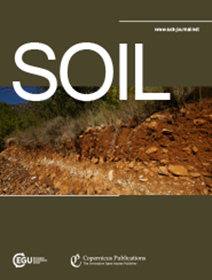Can corporate supply chain sustainability standards contribute to soil protection?
IF 5.8
2区 农林科学
Q1 SOIL SCIENCE
引用次数: 0
Abstract
Abstract. Companies increasingly view soil degradation in their supply chains as a commercial risk. They have applied sustainability standards to manage environmental risks stemming from suppliers' farming operations. To examine the application of supply chain sustainability standards in soil protection, we conducted a study using global data on existing sustainability standards and their use in the food retail industry, a key sector in agrifood supply chains. Soil quality is a priority objective in retail sector sustainability efforts: 41 % of the investigated companies apply some soil-relevant standard. However, the standards lack specific and comprehensive criteria. Compliance typically requires that farmers are aware of soil damage risks and implement some mitigation measures; however, no measurable thresholds are usually assigned. This stands in contrast to some other provisions in a number of standards, such as deforestation criteria. There are two probable causes of this difference: companies and certification bodies have prioritised other environmental challenges (e.g. pesticide use, biodiversity loss in tropical biomes) over soil degradation. Also, there are practical constraints in the useful standardisation of soil sustainability. Effective soil sustainability provisions will require measurable, controllable, and scalable multidimensional interventions and compliance metrics. Often, these are not yet available. The development of necessary practical tools is a priority for future research.企业供应链可持续性标准能否促进土壤保护?
摘要越来越多的公司将供应链中的土壤退化视为一种商业风险。他们采用可持续发展标准来管理供应商耕作活动中产生的环境风险。为了研究供应链可持续发展标准在土壤保护中的应用,我们利用有关现有可持续发展标准及其在食品零售业(农业食品供应链的一个关键部门)中的应用的全球数据进行了一项研究。土壤质量是零售业可持续发展工作的优先目标:41% 的受调查公司采用了一些与土壤相关的标准。然而,这些标准缺乏具体而全面的标准。遵守标准通常要求农民意识到土壤破坏的风险,并实施一些缓解措施;但通常没有指定可衡量的阈值。这与一些标准中的其他规定(如毁林标准)形成了鲜明对比。造成这种差异的原因可能有两个:公司和认证机构将其他环境挑战(如杀虫剂的使用、热带生物群落中生物多样性的丧失)置于土壤退化之上。此外,土壤可持续性的有效标准化也存在实际限制。有效的土壤可持续性规定需要可衡量、可控制、可扩展的多维干预措施和合规指标。而目前往往还不具备这些条件。开发必要的实用工具是未来研究的优先事项。
本文章由计算机程序翻译,如有差异,请以英文原文为准。
求助全文
约1分钟内获得全文
求助全文
来源期刊

Soil
Agricultural and Biological Sciences-Soil Science
CiteScore
10.80
自引率
2.90%
发文量
44
审稿时长
30 weeks
期刊介绍:
SOIL is an international scientific journal dedicated to the publication and discussion of high-quality research in the field of soil system sciences.
SOIL is at the interface between the atmosphere, lithosphere, hydrosphere, and biosphere. SOIL publishes scientific research that contributes to understanding the soil system and its interaction with humans and the entire Earth system. The scope of the journal includes all topics that fall within the study of soil science as a discipline, with an emphasis on studies that integrate soil science with other sciences (hydrology, agronomy, socio-economics, health sciences, atmospheric sciences, etc.).
 求助内容:
求助内容: 应助结果提醒方式:
应助结果提醒方式:


